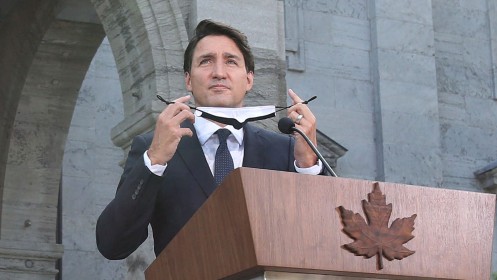Why Canada’s Justin Trudeau has called a snap election
The leader is ‘gambling’ that his Covid record will convince voters to hand him a majority

A free daily email with the biggest news stories of the day – and the best features from TheWeek.com
You are now subscribed
Your newsletter sign-up was successful
Canadian Prime Minister Justin Trudeau has called a snap general election for 20 September, some two years ahead of schedule.
Under Canada’s fixed election date law, the next vote was scheduled for October 2023, explains the BBC, but Trudeau successfully asked Governor General Mary Simon, the representative of head of state Queen Elizabeth, to formally dissolve parliament and authorise a snap poll.
Trudeau told a news conference that, because of the pandemic, “the decisions your government makes right now will define the future your kids and grandkids will grow up in”, adding: “So in this pivotal, consequential moment, who wouldn’t want a say?”
The Week
Escape your echo chamber. Get the facts behind the news, plus analysis from multiple perspectives.

Sign up for The Week's Free Newsletters
From our morning news briefing to a weekly Good News Newsletter, get the best of The Week delivered directly to your inbox.
From our morning news briefing to a weekly Good News Newsletter, get the best of The Week delivered directly to your inbox.
The Telegraph notes that Trudeau, who first won a majority in 2015, “came up short of a majority” in the 2019 election. Therefore, for the last two years, he has led a minority government, relying on opposition parties – largely the left-wing New Democratic Party – to pass legislation and decide on spending.
However, a recent opinion poll put Trudeau on the brink of capturing the 170 seats needed for a majority government. The Liberals have a five-point advantage over the opposition Conservatives.
Therefore, says The Guardian, Trudeau is “gambling that voters will reward his administration’s handing of the coronavirus pandemic” because he “sees an opportunity to win back the majority that voters denied him in 2019”.
The Globe and Mail reports that in the four weeks leading up to the election call, Trudeau’s party made announcements “trumpeting more than $40bn in spending on everything from electric-vehicle charging stations to faster internet to satellite networks and a hydroelectric project”.
A free daily email with the biggest news stories of the day – and the best features from TheWeek.com
Some pollsters feel Trudeau’s move is well timed. “Politically, I don’t really know if there’s been a better time for this government,” David Colleto, chief executive of Abacus Data, told the BBC. “The mood of the public is a good one right now.”
However, notes The Times, another poll “suggests it could be difficult” for Trudeau to get the majority he seeks. A Nanos Research survey on Friday suggested an election would leave Trudeau in power but still without a majority.
He is already under fire from opposition politicians. The New Democratic leader, Jagmeet Singh, who had sent a letter to the newly installed governor general calling on her to reject Trudeau’s request to dissolve parliament, said: “It’s not the right time to have an election.”
And the Conservative opposition leader, Erin O’Toole, echoed: “Canadians are worried about a fourth wave of Covid-19… Now is not the time for an election.”
-
 How the FCC’s ‘equal time’ rule works
How the FCC’s ‘equal time’ rule worksIn the Spotlight The law is at the heart of the Colbert-CBS conflict
-
 What is the endgame in the DHS shutdown?
What is the endgame in the DHS shutdown?Today’s Big Question Democrats want to rein in ICE’s immigration crackdown
-
 ‘Poor time management isn’t just an inconvenience’
‘Poor time management isn’t just an inconvenience’Instant Opinion Opinion, comment and editorials of the day
-
 Greenland’s capital becomes ground zero for the country’s diplomatic straits
Greenland’s capital becomes ground zero for the country’s diplomatic straitsIN THE SPOTLIGHT A flurry of new consular activity in Nuuk shows how important Greenland has become to Europeans’ anxiety about American imperialism
-
 Epstein files topple law CEO, roil UK government
Epstein files topple law CEO, roil UK governmentSpeed Read Peter Mandelson, Britain’s former ambassador to the US, is caught up in the scandal
-
 Iran and US prepare to meet after skirmishes
Iran and US prepare to meet after skirmishesSpeed Read The incident comes amid heightened tensions in the Middle East
-
 Israel retrieves final hostage’s body from Gaza
Israel retrieves final hostage’s body from GazaSpeed Read The 24-year-old police officer was killed during the initial Hamas attack
-
 China’s Xi targets top general in growing purge
China’s Xi targets top general in growing purgeSpeed Read Zhang Youxia is being investigated over ‘grave violations’ of the law
-
 Panama and Canada are negotiating over a crucial copper mine
Panama and Canada are negotiating over a crucial copper mineIn the Spotlight Panama is set to make a final decision on the mine this summer
-
 Why Greenland’s natural resources are nearly impossible to mine
Why Greenland’s natural resources are nearly impossible to mineThe Explainer The country’s natural landscape makes the task extremely difficult
-
 Iran cuts internet as protests escalate
Iran cuts internet as protests escalateSpeed Reada Government buildings across the country have been set on fire